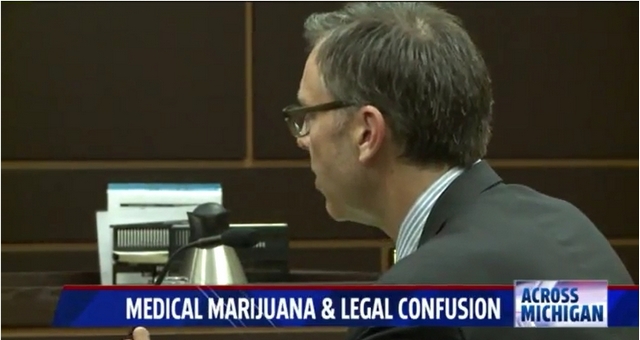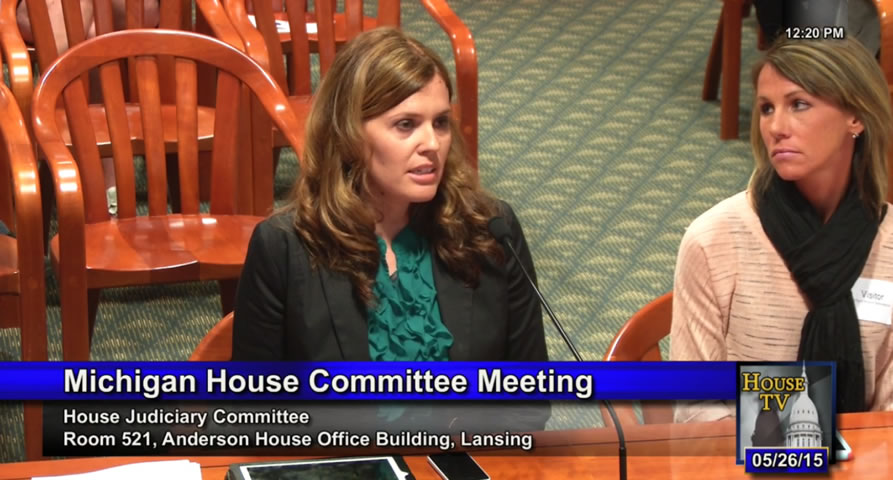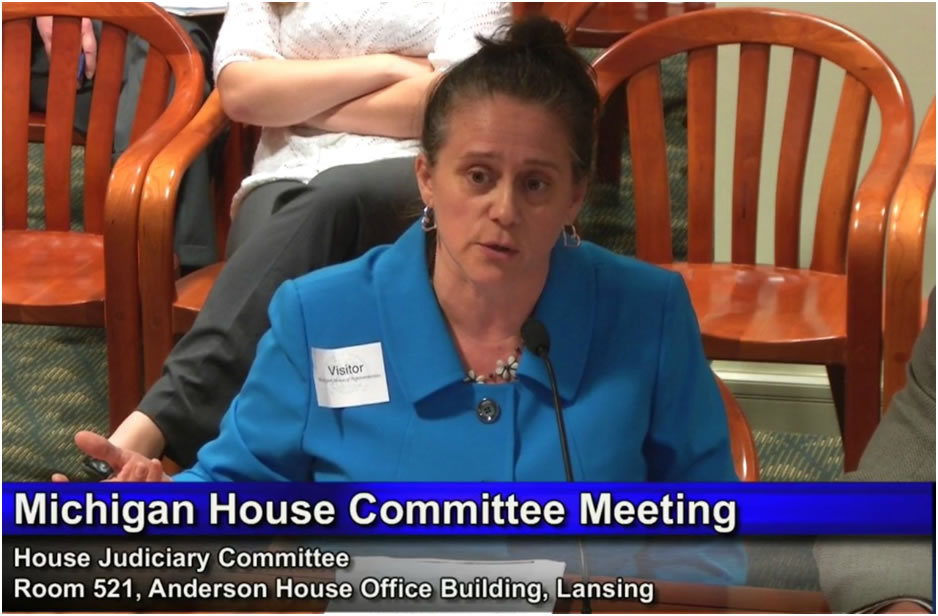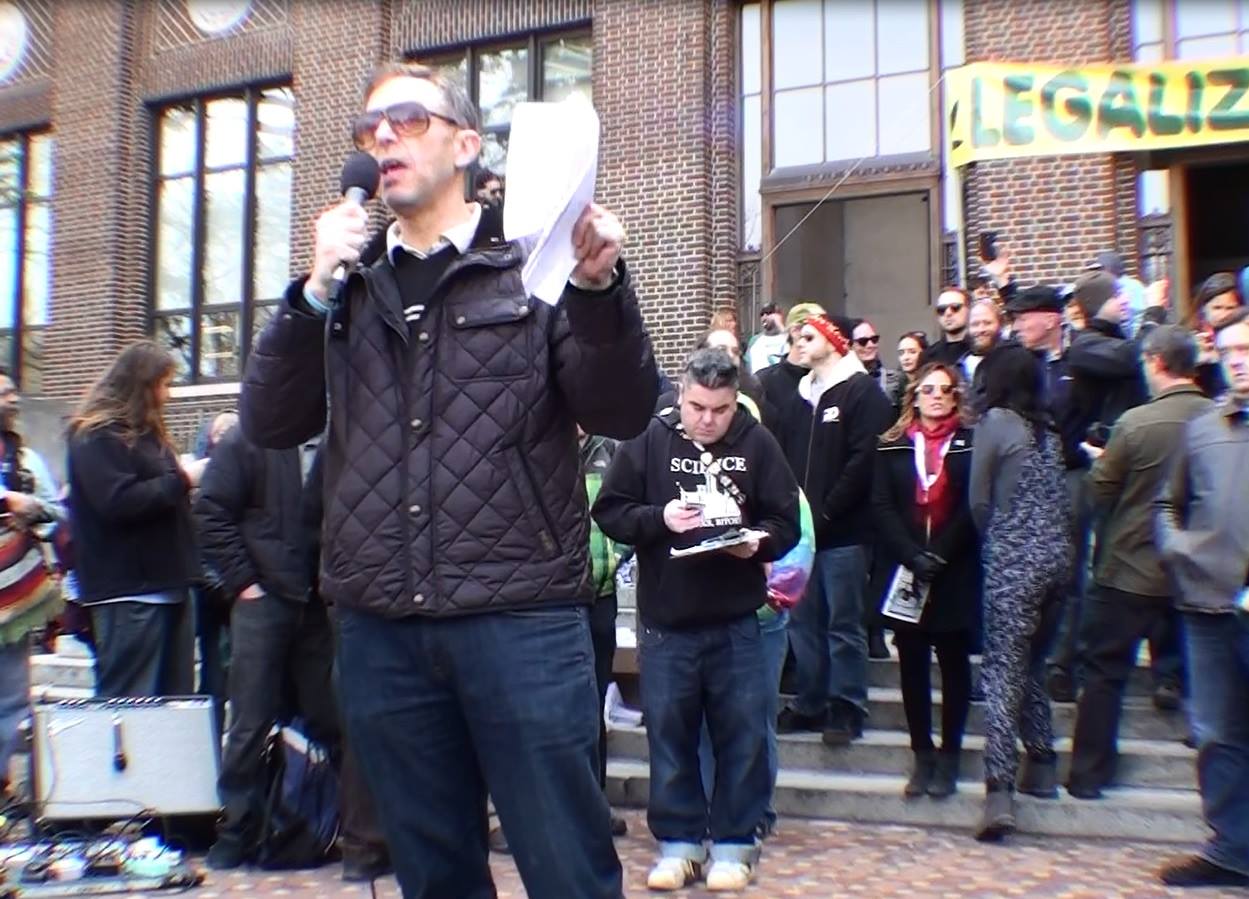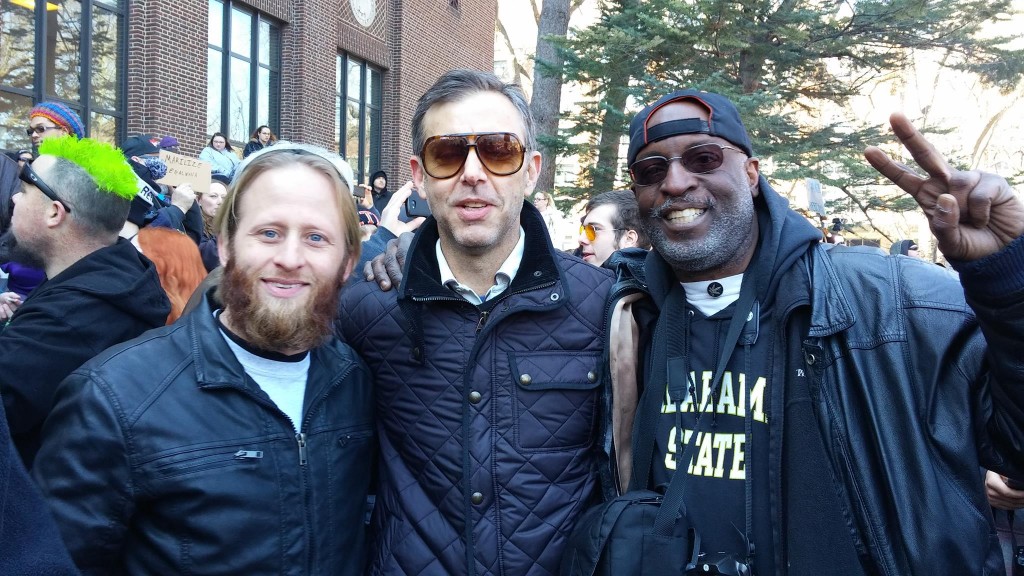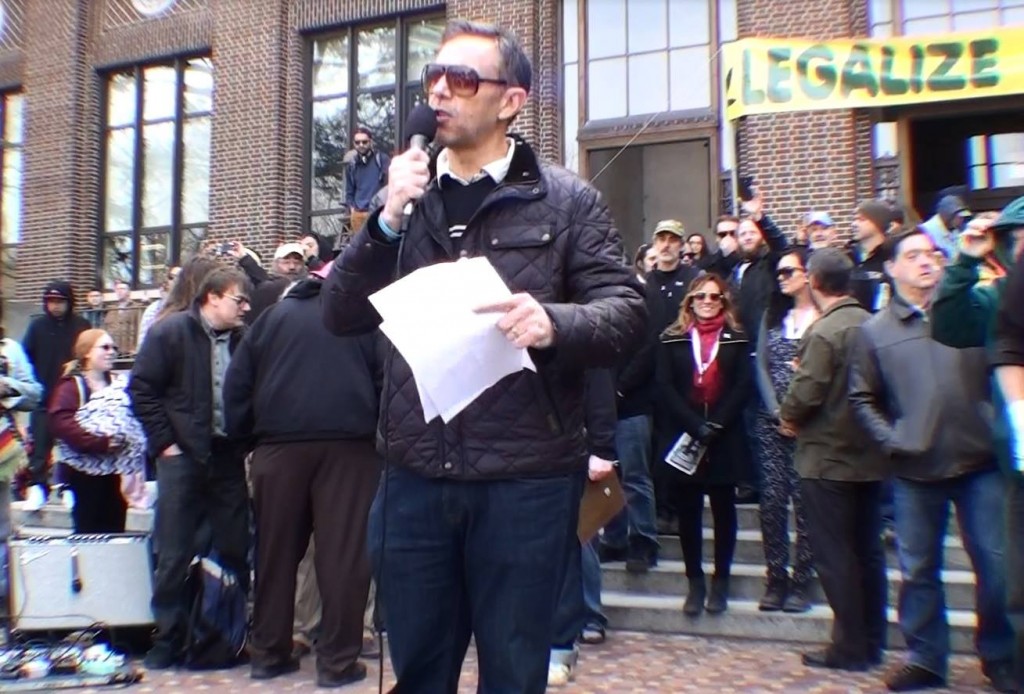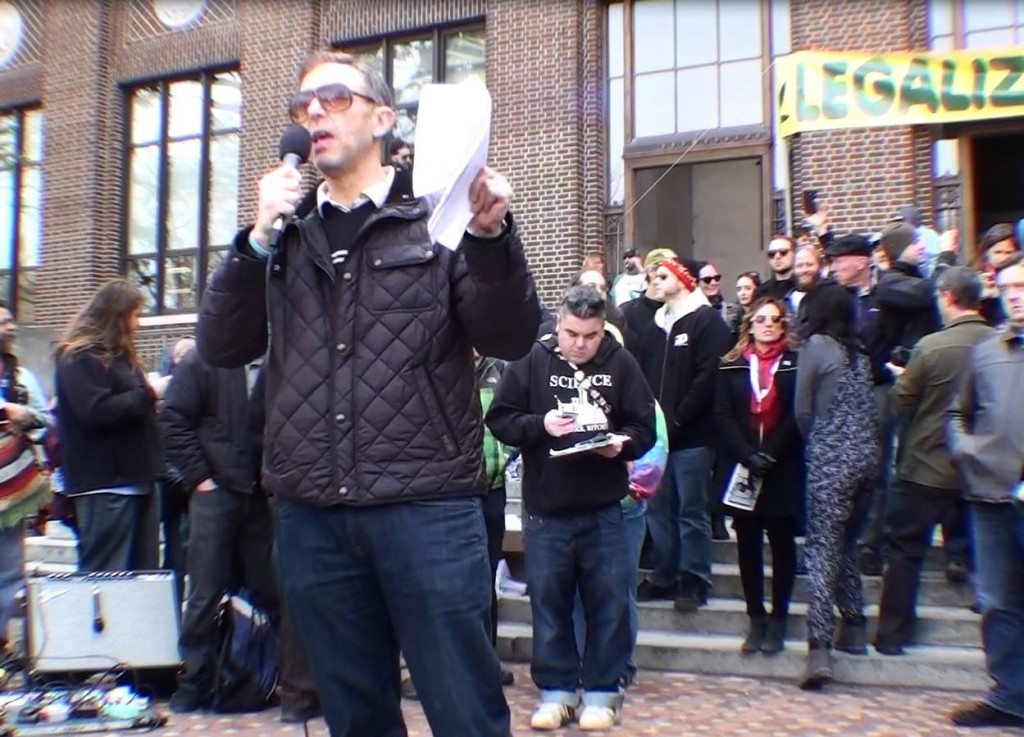
Aug 12, 2015 | Criminal Defense Attorney Michael Komorn, Komorn Law Blog, Marijuana Criminal Defense Attorney Michael Komorn, Medical Marijuana Attorney Michael Komorn
April 23, 2015 – In Western Michigan yet another Michigan Medical Marijuana patient is fighting for his freedom in a system of confusing laws. He is also fighting for the right to see his child all while the State of Michigan possibly destroys his family and financial future. Max Lorincz -unlike most who plead to the sometimes bullying tactics of the court system – is standing up for his right use the medicine recommended by a doctor.
The fly in the ointment in this case is that the marijuana was a concentrate and not what is described as usable in the Michigan Medical Marihuana Act.
The story has been covered by the Fox 17 News program. Below is some further information from the online website.

GRAND RAPIDS, Mich. – A Spring Lake father already served jail time and is due back in court for another felony charge of medical marijuana concentrates possession, despite having a medical marijuana card.
Max Lorincz told FOX 17 has suffered years of pain from a long list of ailments, including herniated back discs and severe celiac disease. Yet when he started to use prescribed medical marijuana edibles and concentrates, his pain faded.
Here’s the hook: even though Lorincz has a medical marijuana card and thought he was following the law, marijuana concentrates are not necessarily protected under the Michigan Medical Marijuana Act.
“When I got on the edibles, it was able to calm my stomach down enough and get things under control better than any medications they’d prescribe me,” said Lorincz.
Recently Lorincz was charged with felony marijuana concentrates possession. As he awaits court, the judge ordered him to be drug tested. Now he said he is forced back on powerful painkillers; pills Lorincz said make him feel like a zombie.
Under the current Michigan Medical Marijuana Act, “usable marijuana” is defined only as the dry leaves or dry flowers of the plant. Under its section four, users are protected to have up to 2.5 ounces of “usable marijuana,” Concentrates are not and according to the People v. Carruthers, don’t qualify for section 4 immunity.
Medical marijuana users can find defenses under section 8 of the act when they meet certain criteria. Prosecuting status quo tactics are usually stripping a defendant of their section 4 and section 8 immunity by any means therefore disallowing any reference of medical marijuana in a trial to a jury.
There is legislation pending that would amend the Michigan Medical Marijuana Act to include perhaps a more specific definition of “usable marijuana.” However, this House Bill 5104 has been hung up for months, after the Michigan Senate referred it to a committee last August.
Since seeing FOX 17’s coverage of Lorincz’s case back in February, Defense Attorney and President of the Michigan Medical Marijuana Association Michael Komorn took on Lorincz’s case pro bono. For the last six years, Komorn said he’s dedicated his practice exclusively to medical marijuana patient and caregiver representation.
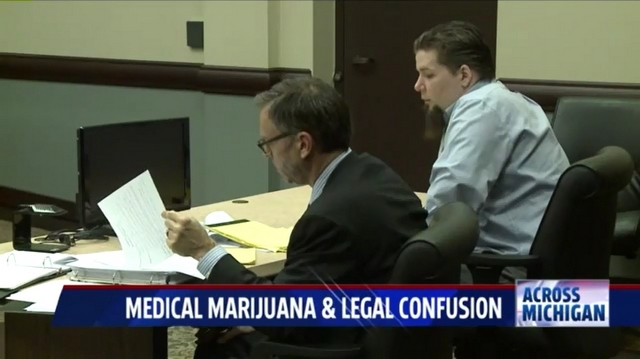
But his case has come with some devastating consequences. In February Lorincz was charged with a two-year felony: possession of a schedule 1, controlled, synthetic substance. Schedule 1 is defined as a controlled substance that has no medical use.
Now his five-year-old son is taken away, and he is left with only supervised visits. All of this because Lorincz called 911 in September for a family medical emergency. The deputy who responded to the call found a smear of butane hash oil in his home. It’s a substance Lorincz ingests for what he called “deep pain relief,” and is something he obtained with his medical marijuana card.

“I’m outraged by it, it shouldn’t have happened,” said Komorn.
Komorn said medical marijuana is not a controlled substance. In fact, Michigan law states marijuana is a schedule 2 drug. Yet because Lorincz is charged with having a schedule 1 drug, and not specifically marijuana, Komorn said it is difficult to protect Lorincz under section 8 immunity of the Michigan Medical Marijuana Act.
Komorn believed part of the issue is a recent policy change in Michigan State Police Lab reporting.
“They had a policy change by why?” asked Komorn. “The policy changed. The motivation for it was if they report it this way, people like Max won’t be able to claim a medical marijuana defense.”
The lab technician in Lorincz’s case testified that he has been testing tetrahydrocannabinol, or THC, for 25 years. THC is the main psychoactive ingredient in marijuana, also present in synthetics. However, a recent policy change means the technicians have to write “origin unknown” when testing this type of THC on lab reports. The technician said he could not tell if the sample was synthetic or natural.
The prosecution argued Lorincz’s residue was not “usable marijuana,” as defined in the previous court case, People versus Carruthers; therefore, Lorincz should be bound over for trial. However, Komorn argued that a hash extraction comes directly from the resin of the plant.
Komorn said this lab policy change is the difference between a felony and no charge at all for Lorincz, stating he should be protected under the Michigan Medical Marijuana Act. Komorn asked the judge to dismiss it.
“(The lab technician) admitted that on the stand,” said Komorn. “That is very, very, very disturbing to me, because it means that the politics in the law are affecting the truth. That’s not how it’s supposed to be. We’re supposed to rely on science to make the case.”
For now Lorincz said he is following court’s orders and is back to taking what he calls debilitating prescription pain-killers.
Read More Detail From Fox 17 The Report Here
Also Check This Out
Prescription Pain Killers – Deaths Fall In States With Medical Marijuana

Jun 4, 2015 | Criminal Defense Attorney Michael Komorn, Komorn Law Blog, News
The headlines read…
“How a sex toy put national spotlight on Michigan civil asset forfeiture laws targeted for reform”
“State Legislators Reconsider Forfeiture Laws That Turn Cops Into Robbers”
“Why Take My Vibrator?” Cops Legally Rob “every Belonging”
It’s been featured on many news outlets large and small.
Some of the main ones include Fox, MLive, Forbes, Washington Post, MMMA, and so many more.
Ginnifer Hency says that a police raid led investigators to seize a couple of guns, a small amount of cash and cell phones , medical marijuana. And also something very personal…
“My medicine for my patients, why a ladder, why my vibrator, I don’t know either,” Hency said during a Michigan House Committee meeting.
Click to play video
Ginnifer Hency’s vibrator was not an accessory to an alleged crime that a judge says did not occur. And that last part is creating quite a story that has now gone viral and raising questions about Michigan’s civil asset forfeiture laws.
“They’ve had my stuff for 10 months now,” Hency said.
Ginnifer and her husband Dean Hency say it all happened when their home was raided last July. They both are licensed medical marijuana patients and caregivers. They claim to be targeted by St. Clair County’s drug task force.
It began when Ginnifer says she walked into a medical marijuana licensing facility as it was being raided. “They asked me how much medicine I had in my backpack,” she said. “I said six ounces then they said to get a warrant for our house.”
The havoc they wreaked,” Dean said, “they just threw stuff around. Just dirt dumped all over the place.” “We were in complete compliance with the Michigan Medical Marijuana Act and they destroyed my house,” Ginnifer said.
But St. Clair County Sheriff Tim Donnellon says they were not, and added that officers did not take her vibrator and would never have a reason to. He says aside from that allegation, the task force’s actions were justified and par for the course.
Even so, a judge (read the courts opinion here – specifically the last page regarding Hency) dismissed the criminal charge of possession with intent to distribute against Ginnifer Hency two weeks ago. But here’s what she says happened when she went to the prosecutor’s office to get her property back.
“Lisa Wisniewski who is the assistant prosecuting attorney said ‘I can still beat you in civil court, I can still take your stuff.”
Michael Komorn who is the Hencys’ lawyer said. “This is bully tactics, we have your property we couldn’t get any charges to stick, we’re just going to keep it and drag it out.”
“Here’s a person who they took her property and they couldn’t even make the charges stick let alone get a conviction. So if there’s an example of why there needs to be reform it’s this.” added her attorney Michael Komorn.
“They left my (equipment) I used to grow ‘drugs’ – they left that,” Hency said when she testified. “Now that is what the state forfeiture laws are made for.” The St. Clair County Prosecutor’s Office has about a week to appeal a visiting judge’s decision to drop those charges against Ginnifer Hency.
When she heard that, Hency said, “I was at a loss. I literally just sat there dumbfounded.”
Hency told her story at a meeting of the Michigan House Judiciary Committee, which was considering several bills that would make this sort of legalized larceny more difficult.
She was joined by Annette Shattuck, another medical marijuana patient who was raided by the St. Clair County Drug Task Force around the same time.
“After they breached the door at gunpoint with masks, they proceeded to take every belonging in my house,” Shattuck said.
The cops’ haul included bicycles, her husband’s tools, a lawn mower, a weed whacker, her children’s Christmas presents, cash (totaling $85) taken from her daughter’s birthday cards, the kids’ car seats and soccer equipment, and vital documents such as driver’s licenses, insurance cards, and birth certificates.
“How do you explain to your kids when they come home and everything is gone?” Shattuck asked. She added that her 9-year-old daughter is now afraid of the police and “cried for weeks” because the cops threatened to shoot the family dog during the raid.
Although “my husband and I have not been convicted of any crime,” Shattuck said, they cannot get their property back, and their bank accounts remain frozen.
Last February The Detroit Free Press highlighted various other examples of the cruel, greedy pettiness fostered by civil forfeiture laws, which allow police to take assets allegedly linked to crime without so much as filing charges, let alone obtaining a conviction.
“Police seized more than $24 million in assets from Michiganders in 2013,” the paper noted. “In many cases the citizens were never charged with a crime but lost their property anyway.”
Now a bipartisan group of state legislators is trying to reform the laws that have turned Michigan cops into robbers.
The bills, which are backed by House Judiciary Committee Chairman Klint Kesto (R-Commerce Township), would require law enforcement agencies to keep track of all forfeitures and report them to the state police, prohibit the forfeiture of vehicles used to purchase small amounts of marijuana, and raise the standard of proof for forfeitures in cases involving drugs or public nuisances.
“We must bring culpability and transparency to the system and rein in the ability of police to indiscriminately seize the property of innocent citizens,” Kesto says.
Michigan was one of five states that received a D–, the lowest grade awarded, in a 2010 report on forfeiture abuse from the Institute for Justice. Michigan’s “preponderance of the evidence” standard, which allows the government to complete a forfeiture based on any probability greater than 50 percent that the asset is connected to a crime, was one reason for that low grade.
Bills introduced by Rep. Peter Lucido (R-Shelby Township) and Rep. Gary Glenn (R-Midland) would instead require “clear and convincing” evidence, which is more demanding than the current rule but not as strict as “beyond a reasonable doubt,” the standard in criminal cases.
None of the bills addresses another major problem with forfeiture in Michigan:
Law enforcement agencies keep 100 percent of the loot, which gives them a strong incentive to target people based on the assets they own instead of the threat they pose to public safety.
Testifying (play video) before Kesto’s committee on Tuesday, Charmie Gholson, founder of Michigan
Moms United, argued that cops’ financial stake in forfeitures helps explain why the arrest rates for consensual crimes involving drugs and prostitution are so much higher than the arrest rates for violent crimes such as rape, robbery, assault, and murder.

Charmie Gholson (Image: Michigan House of Representatives)
In Michigan, Gholson said, the arrest rate (the share of reported incidents that result in an arrest) is 82 percent for prostitution, compared to 44 percent for murder, 39 percent for felonious assault, 21 percent for robbery, and 15 percent for rape. “It’s because when they catch you with a prostitute, they take your car,” she said. “Civil asset forfeiture decreases public safety.”
Gholson thinks money from forfeitures should go into the general fund, which would eliminate such perverse incentives. She also argues that forfeiture should require a conviction based on proof beyond a reasonable doubt, which would effectively abolish the practice of civil (as opposed to criminal) forfeiture. The Institute for Justice, which has been fighting forfeiture abuse for years, agrees.
Both of those reforms were recently adopted by New Mexico, which got a D+ in the 2010 Institute for Justice report. The New Mexico law also bars police and prosecutors from evading state limits on forfeiture by pursuing seizures under federal law through the Justice Department’s Equitable Sharing Program.
Last month legislators in Montana, which like New Mexico got a D+ in 2010, likewise voted to require a conviction prior to forfeiture.
But police and prosecutors in Montana will continue to keep all the proceeds from forfeitures, and they are still free to engage in joint forfeitures with the feds, which are subject to a lower evidentiary standard.
Compared to the reforms in New Mexico and Montana, the changes proposed in Michigan are pretty modest. But forfeiture critics hope the new comprehensive reporting requirement will set the stage for more ambitious reform by showing how the profit motive warps law enforcement priorities.
“You need more details about how seizures are happening,” Lee McGrath, legislative counsel at the Institute for Justice, told the Free Press. He said such data will expose the myth that “these forfeitures target big international criminal syndicates.” McGrath called the bills “a solid first step toward the ultimate goal of ending civil forfeiture.”
Michael Komorn is recognized as a leading expert on the Michigan Medical Marihuana Act. He is the President of theMichigan Medical Marijuana Association (MMMA), a nonprofit patient advocacy group with over 26,000 members, which advocates for medical marijuana patients, and caregiver rights. Michael is also the host of Planet Green Trees Radio, a marijuana reform based show, which is broadcast every Thursday night 8-10 pm EST. Follow Komorn on Twitter.


May 14, 2015 | Komorn Law Blog
When is a Search Warrant Required?
Fourth Amendent
The Fourth Amendment to the United States Constitution protects Americans from unreasonable searches by the government. That means that absent an emergency situation or other legal exception, a police officer must have a search warrant before conducting a search of your person or property.
How a Search Warrant is Obtained
The Fourth Amendment requires that searches be specific and reasonable. That means that a judge will only approve a search warrant if law enforcement is specific as to the items and location it wishes to search. Law enforcement must also prove that probable cause exists that a specific item is located in a specific place.
Whether the warrant gets issued or not is up to the judge’s review. If a judge finds that law enforcement has met its burden of probable cause and has included enough specificity in the request for the warrant, then the judge will issue the search warrant.
The suspect is not present during this proceeding and is not given an opportunity to present his or her argument against the issuance of a warrant. However, in later proceedings the suspect may argue that a search warrant was improperly granted.
When a Search Warrant is Not Necessary
There are a few situations when law enforcement is exempt from obtaining a search warrant. Those situations include:
Consent: Law enforcement can request to enter a person’s home or search a person’s belongings. If the person consents to the search and gives law enforcement permission to conduct the search then a warrant is unnecessary.
Plain View Doctrine: Law enforcement does not need a search warrant to obtain evidence that is in plain sight. For example, if an officer is walking down the street and sees a person with drugs in the park then the officer may arrest that person and keep the drugs as evidence even though a search warrant was not obtained. This exception exists because individuals do not have a reasonable expectation of privacy when they are in plain view.
Emergency Situation: If the police are in pursuit of a felon and follow that alleged felon into a home or other private area – then they do not need a warrant to obtain evidence that is in plain sight when they enter the building.
For example, a police officer may witness a robbery or a crime and begin to pursue the criminal to make an arrest. If the criminal flees and takes refuge in a private residence then the police may follow him and they do not need a search warrant to enter the home nor to collect evidence that is in plain sight or within the reach of the alleged criminal.
Police may also enter a residence without a warrant if they hear a person screaming for help or have reason to believe that a person or property is in imminent danger and that harm would result in the time it would take to obtain a search warrant.
Search Incident to Arrest: Police officers may search the body and immediate surroundings of a person whom they take into custody. The courts have allowed this exception to the search warrant rule in order to protect police officers from people who may have concealed weapons.
Search warrants are the government’s way of balancing an individual’s Fourth Amendment rights with the societal interest in limiting crime and protecting the public. Therefore, the general rule is that a search warrant must be obtained before the police conduct a search but exceptions to that rule exist to protect police officers and society from harm.

May 2, 2015 | Komorn Law Blog, Medical Marijuana, Michigan Medical Marijuana Criminal Defense Attorney Michael Komorn, News
Attorney Michael Komorn Speaks Out at the Hash Bash 2015 Rally!
Thank you, it is truly an honor to be here today. This is a special gathering… one that I look forward to every year.
It is an exciting time in the United States, it would appear that there is great momentum amongst us…for a more rational approach to marihuana policy.
As a lawyer, may I suggest…Do not believe everything you read or see!
The MMMA – In November of 2008, Michigan voters passed the Michigan Medical Marihuana Act (mmma). A lot of people don’t realize that more Michiganders voted for the mmma than any other issue, candidate legislation or policy decision in the history of Michigan elections. 3.3 million people declared that the sick, the wounded, and the people that care for them should be taken off the battlefield of the biggest losing war in the history of the world…on the war on marihuana.
Yet, what we have seen instead is a calculated strategy to derail the voter’s intent from the institutions that are truly in control.
This has to stop!
For 6 years across the state of Michigan:
Narcotic drug task forces have become specialized investigative armies finding or creating loopholes in the protections from arrest and prosecution of patient, caregivers and even doctors.
Prosecutors across this state have strategically litigated and courts have supported denying medical marihuana patients the simple right to present a medical marihuana defense to charges alleging marihuana violations. The most clear and unambiguous paragraph in the voters initiative of 2008 specifically decreed that registered and unregistered patients shall have a medical defense to any charges involving marihuana. This decree has been ignored.
Persons have been forced to plead guilty to felonies regarding marihuana or go to trial without being able to mention medical use of marihuana.
This is wrong and has to stop!
No matter what kind of law is passed, no matter how evolved we have become, the institutions charged with enforcing and interpreting the law control the tables.
These intuitions are and should be clearly identified as the enemy of ours and this a concern that we as a community must focus upon for change.
Specifically – The problem is that it is nearly impossible to maintain rational drug policy reform, or even medical marihuana reform, and honor the will of the people when there is no reform for the arcane and mid evil forfeiture laws that currently exists.
The prosecution of persons and the criminalization of marihuana is about big money.
And this must change!
In any courtroom throughout this great state of ours the business of the day remains marihuana cases.
At least 40 percent of the courts dockets are still making up marihuana cases. It may be felony or misdemeanor charges, or probation violations for having tested positive for cannabis.
It is difficult to view cannabis as medicine, or even recreational, when so much revenue is brought into the state from those persons who use marihuana.
This must change!
Forfeiture – In 2014, the state of Michigan reported a net earning of 20 million dollars from forfeiture proceedings.
2014 was the year the media started reporting sheriff departments and other specialized agencies throughout Michigan acquiring military equipment from the department of defense. Begging the question, why do we need military equipment to police our own citizens???
The answer is obvious. We are still at war with families, people and citizens when cannabis is perceived as contraband per se. If we accept the concept that those who use marihuana are the criminals, then it follows we can incarcerate them, charge them money, and fund the police and prison industrial complexes.
The United States is the world’s leader in incarceration with 2.2 million people currently in the nation’s prisons or jails — a 500% increase over the past thirty years!
From 1980 to 2008, the number of people incarcerated in America quadrupled-from roughly 500,000 to 2.3 million people
Today, the US is 5% of the World population and has 25% of world prisoners. 1 in every 31 adults, or 3.2 percent of the population is under some form of correctional control.
Racial Disparities in Incarceration
African-Americans now constitute nearly 1 million of the total 2.3 million incarcerated population
African-Americans are incarcerated at nearly six times the rate of whites
African-American and Hispanics comprised 58% of the prison population. This is a racist policy, it exists all over the the state of Michigan and it is time for our state to call ourselves out.
We can be better!
This must change!
In 2014, the Michigan Court of Appeals in a case People v Cunningham. The way courts have been issuing costs and fines was unreasonable and dramatically reduced the way people can be charged fees and court costs.
Then the court lobby decreed that they would lose over $100 million dollars. Legislation was passed to override what the court of appeals had declared was unreasonable and reprehensible.
You may ask yourself… why does the court need to lobby?
You may ask yourself… this is not my beautiful home?
You may ask yourself… this is not my beautiful wife?
You may ask yourself… how did I get here??
This must change!
We gather here today, the first Saturday of April, to recognize the insanity of all of this.
We acknowledge the insanity that Prophet John Sinclair was sentenced to 10 years in prison for 2 stinky joints.
The Michigan Supreme Court ultimately conclude in this case,
“That there is no rational basis for cannabis to be scheduled as a schedule 1 control substance and for a short period of time cannabis was de-scheduled. “
Often overlooked in the magic of the Michigan Medical Marijuana Act is the declaration of Michigan voters, in conjunction with the federally funded National Institute of Science, that cannabis has a number of medical benefits in the treatment of debilitating conditions. By virtue of vote, cannabis was removed from its classification of a schedule 1 drug.
The Michigan voters in 2008 echoed the Michigan Supreme Court ruling from 1972, declaring the same as in the People v John Sinclair, and de-scheduled marihuana in Michigan.
Unfortunately, every criminal statute in the Michigan public health code still criminalizes cannabis as a schedule 1 drug.
Let me say that again. Despite 3.3 million Michiganders (63 percent of the voters in Michigan) declaring cannabis is medicine, it remains classified and criminalized as a schedule 1 drug.
Currently, the way in which people are prosecuted for cannabis crimes in Michigan is premised upon the drug being a schedule 1, or having no accepted medical treatment.
This must change!
At the same time, the United States’ 37 president, Richard Millhouse Nixon, while running a burglary ring out of the White House, rejected his handpicked commission after 2 years of independent research (now known as the Schafer Report) concluding that cannabis should not remain as a schedule 1 drug. At that time, The Schafer Report was the most comprehensive study regarding cannabis. After 2 years of study, research concluded that cannabis should not remain as a schedule 1 drug, and to criminalize marihuana would be the equivalent of criminalizing single parent families.
Nixon of course looked at the authors of the report and said, “didn’t you get the memo…the Blacks, the Jews, the Vietnam protesters and the Hippies use cannabis, these are the political enemies. If we criminalize cannabis we can imprison them and remove our competition.”
This is the history of cannabis. It is a racist policy. It is a policy created by a President for political reasons based upon a lie.
This policy has caused more carnage and destruction to families, more pain and suffering, and casualties than anything else in our recent history, and so it remains today.
As a policy… it is immoral, illegal and a complete failure.
This must change!
It is time in America to declare that adult responsible use of marihuana is okay. It is time for America to have an American made industry of cannabis. Thousands of Americans can attest to this fact.
It is time to start treating cannabis as other goods and services.
It should be okay for cannabis users to demand the highest quality cannabis in whatever forms they should choose to ingest. And with as little effort as necessary to acquire it.
We rally for freedom today and I am proud to be a part of this.
I will leave you with a comment. A police officer friend of mine said to me the other day,
“If you put 5 people in a room and give them a case of beer they will start a fight.
If you put the same 5 people in a room and give them a joint they will start a band.”
It is time to stop fighting and time to play some music!
Thank you!

May 2, 2015 | Komorn Law Blog, News, Uncategorized
As always, there is so much important material to highlight and share with those who are interested in all of our favorite topics: medical cannabis, cannabis reform, United States citizens’ constitutional protections, the art of lawyering and trial practice, and industrial hemp research and development. The month of April 2015 was exciting and we hope you enjoy some of the highlights.
The 44th Annual Hash Bash of 2015
The first Saturday of April in Ann Arbor is always reserved for Hash Bash. More than 8,000 people showed up for this year’s event. In what has truly turned into a political and freedom rally, this year was no different and the guests and speakers exemplified this spirit. Friend and fellow Cannabis Reform activist Jim Powers and his young son Ryan, a cannabis patient, were the lead off speakers, setting a tone that this was not your momma’s hash bash. Amongst the diversity of speakers were several patients…each telling their miracle stories of how cannabis improved their medical conditions; one even stating it cured their cancer. Political Leaders were in abundance as well. Friend and one of the few politicians anyone can say that they like, Jeff Irwin of Michigan’s House of Representatives was there. In addition, Ann Arbor’s Mayor Sabra Briere, Lansing’s Mayor Virg Bernero, Comedian/Actor/Activist Tommy Chong, and John Sinclair spoke at the event.
Many People probably don’t understand the history and significance of Hash Bash. Hash Bash is an annual event held in Ann Arbor, Michigan, on the first Saturday of April…at high noon on the University of Michigan’s Diag. A collection of speeches, live music, street vending and occasional civil disobedience are centered on the goal of reforming federal, state, and local marijuana laws. The first Hash Bash was held on Saturday, April 1, 1972 in response to the March 9th, 1972 decision by the Michigan Supreme Court declaring the law it used to convict cultural activist John Sinclair for possession of two marijuana joints unconstitutional. This action left the State of Michigan without a law prohibiting the use of marijuana until after the weekend of April 1, 1972.
The John Sinclair case, albeit a 1972 opinion, is still good law in Michigan and one would think would be a good case to rely upon to truly reform the current hypocritical and arcane crimes for the growth, use and possession of marihuana. In the meantime Komorn Law cited and relied upon this case often in our amicus curiae brief we filed before the Michigan Supreme Court in the matters currently pending; People v. Tutttle and People v. Hartwick arguing amongst other things that Marijuana is not and cannot be a schedule 1 controlled substance under Michigan law.
Reference Links to these Cases can be found here:
Link to the video of the arguments.
An audio recording of oral arguments before Michigan Supreme Court concerning “People vs. John Sinclair” can be found here
People v. Sinclair, 379 Mich. 91 (1972)
Here are some of the compelling findings in that case:
The Michigan Supreme Court has made findings of fact that are relevant here. “It cannot be doubted that the judiciary has the power to determine the true state of facts upon which a (in this case marijuana) law is based.” People v. Sinclair, 379 Mich. 91 (1972) citing Brown v. Board of Education, 347 U.S. 483, 74 S.Ct. 686, 98 L.Ed. 873 (1954). The Michigan Supreme Court in Sinclair addressed the issue of the rationality of the State’s marijuana laws and held:
Comparison of the effects of marijuana use on both the individual and society with the effects of other drug use demonstrates not only that there is no rational basis for classifying marijuana with the ‘hard narcotics’, but, also, that there is not even a rational basis for treating marijuana as a more dangerous drug than alcohol.” Sinclair, 379 Mich. at 103. “No physical dependency is produced by use of the drug and, hence, there are no withdrawal symptoms or ‘abstinence syndrome’ when the drug is unavailable to the user. No lethal dose for marijuana has been established… the evidence available concerning marijuana’s effect on psychomotor functions seems to show very little impairment, at least in experienced users. Id. At 107.
There is no reliable scientific evidence demonstrating that chronic psychosis can be caused by marijuana use in dramatic contrast to the American experience with alcohol. The argument that marijuana use causes or contributes to assaultive crime is now largely discredited. Again by contrast, considerable evidence points to a substantial connection between alcohol use and commission of violent crimes. Finally, the ‘stepping stone argument’ that marijuana use leads to use of ‘hard narcotics’ has no scientific basis. Id at 110. (internal citations omitted).
The Michigan Supreme Court went on to hold: “The murky atmosphere of ignorance and misinformation which casts its pall over the State and Federal legislatures’ original classification of marijuana with the hard narcotics has been well documented… We can no longer allow the residuals of that early misinformation to continue choking off a rational evaluation of marijuana… The truth compels us to conclude at the minimum that marijuana has been erroneously classified with the opiates….” Id at 114-15 (emphasis added). Or as a concurring Justice noted, “Possession of a natural growing plant can hardly be malum in se (evil in and of itself). Id at 152. The court reversed Sinclair’s conviction as violative of equal protection because of the irrational classification of marijuana and the cruel and unusual nature of the excessive punishment.
Marijuana is not and cannot be a schedule 1 controlled substance under Michigan law. Thank you John Sinclair.
Another stand out from Hash Bash 2015 was Lansing’s Mayor Virg Benero, who took to the podium and led the crowd in a new version of “Free the Weed.” While standing before what would normally be an unfriendly Ann Arbor crowd, the Lansing Mayor let it be known that he has had a revelation. As he stated to the crowd “I realize now that war on marihuana is a war on people. I realize now that when this crowd chants, “free the weed,” what you are really saying is free the people. So then….will you join me-when I say free the weed, you say free the People.”
 Lansing Mayor Virg Benero – Taking a stand on Sanity – Hash Bash 2015
Lansing Mayor Virg Benero – Taking a stand on Sanity – Hash Bash 2015
Attorney Michael Komorn – Speaks Out – Hash Bash 2015
https://www.youtube.com/watch?v=bo_AgWCPRdY
Although I didn’t get a chance to get through my entire speech, I have posted a link here to the written version of my Hash Bash 2015 Komorn rant. Also it can be heard here in the PGT rant episode 244
Some pics from Hash Bash 2015:








Apr 7, 2015 | Criminal Defense Attorney Michael Komorn, Komorn Law Blog, Michigan Medical Marijuana Criminal Defense Attorney Michael Komorn
I wanted to give a huge thanks to University of Michigan Law School Professors Howard Bromberg, Mark Osbeck and Law School class.
This past Thursday I had the honor of being asked to speak about my favorite topics, the Michigan Medical Marihuana Act and the practice of Law. The discussion and questions were lively and I appreciate the interest the class had in this developing area of law in Michigan.
Thank you so much for the opportunity and the very enjoyable afternoon.
Komorn Law Social Media
Recent Posts
Tag Cloud
2021
BMMR
cannabis
CBD
corruption. prosecutors
dispensary
Driving
DUI
forfeiture
gun rights
hemp
komornlaw
lara
law enforcement abuse
laws
Legalization
marijuana
Medical Marijuana
Michigan
michigan laws
michigan news
MMFLA
MRA
news
police
politics
science
usa news
us supreme court
Your Rights
DISCLAIMER
This post may contain re-posted content, opinions, comments, ads, third party posts, outdated information, posts from disgruntled persons, posts from those with agendas and general internet BS. Therefore…Before you believe anything on the internet regarding anything – do your research on Official Government and State Sites, Call the Michigan State Police, Check the State Attorney General Website and Consult an Attorney – Use Your Brain.




